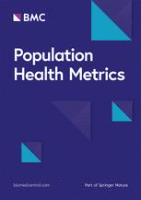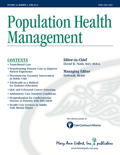
International Journal of Population Data Science (IJPDS)
Scope & Guideline
Illuminating population trends through rigorous analysis.
Introduction
Aims and Scopes
- Data Linkage and Integration:
The journal emphasizes the development and application of data linkage techniques, enabling researchers to combine various datasets for comprehensive analyses of health and social outcomes. - Health Analytics and Evaluation:
Research published in IJPDS often involves health analytics, focusing on evaluating health services, outcomes, and the effectiveness of interventions through data-driven methodologies. - Population Health Studies:
The core area of the journal includes studies that examine health trends, disparities, and outcomes across different population groups, emphasizing the importance of demographic factors. - Methodological Innovations in Data Science:
IJPDS encourages research that introduces novel methodologies and technologies, such as machine learning and synthetic data generation, to enhance the quality and utility of population data. - Ethics and Governance in Data Use:
The journal also explores the ethical considerations and governance frameworks surrounding the use of population data, ensuring that research adheres to standards of privacy and social license.
Trending and Emerging
- Synthetic Data Generation:
There is a growing interest in the use of synthetic data to enhance research capabilities while addressing privacy concerns. This trend is significant as it allows researchers to test hypotheses without compromising sensitive information. - Cross-Sectoral Data Linkage:
Research that integrates data across various sectors (e.g., health, education, social services) is on the rise, illustrating the need for comprehensive approaches to address complex public health challenges. - Data Governance and Ethical Frameworks:
As data utilization becomes more prevalent, there is a heightened focus on developing robust governance frameworks and ethical guidelines for data sharing and linkage, ensuring responsible research practices. - Longitudinal and Cohort Studies:
Emerging themes include the establishment of extensive longitudinal cohorts that facilitate long-term studies on health and social outcomes, reflecting a trend towards in-depth analysis of population dynamics over time. - Machine Learning and Advanced Analytics:
The integration of machine learning techniques in population data analysis is gaining traction, enabling researchers to uncover patterns and insights from large datasets more efficiently.
Declining or Waning
- Traditional Epidemiological Studies:
There appears to be a waning interest in traditional epidemiological methods that do not leverage advanced data integration or linkage techniques, as researchers increasingly favor more innovative approaches. - Single Data Source Analyses:
Papers relying solely on single datasets without linkage are becoming less common, indicating a preference for studies that utilize multiple data streams to provide a more holistic understanding of health issues. - General Health Services Research:
While health services research remains relevant, there is a noticeable shift towards more specialized studies that focus on specific populations or conditions, rather than broad assessments of health service utilization.
Similar Journals

Journal of the American Nutrition Association
Connecting Research with Real-World Nutrition SolutionsJournal of the American Nutrition Association is a premier scholarly outlet dedicated to advancing the field of nutrition science. Published by ROUTLEDGE JOURNALS, TAYLOR & FRANCIS LTD, this journal aims to disseminate high-quality research that addresses the complexities of diet, health, and nutrition in various populations. With a robust impact factor demonstrating its significance in the realm of Medicine and Nutrition, it holds notable ranks in both the Medicine (miscellaneous) and Nutrition and Dietetics categories within Scopus. The journal supports a vision of expanding access to vital nutrition research through its open-access options, enhancing the visibility and impact of published works. As it continues to evolve from 2022 to 2024, the Journal of the American Nutrition Association stands as an invaluable resource for researchers, health professionals, and students keen on contributing to and staying informed about the latest advancements in nutrition science.

Population Health Metrics
Connecting Research to Real-World Health OutcomesPopulation Health Metrics, an esteemed journal published by BMC, has established itself as a leading platform for researchers and practitioners in the fields of epidemiology and public health. Since its inception in 2003, this open-access journal from the United Kingdom has been dedicated to advancing the understanding of health metrics, offering insightful analyses and data-driven research that address critical global health challenges. With an impressive Q1 ranking in both Epidemiology and Public Health, Environmental and Occupational Health categories, along with a robust Scopus percentile ranking in its field, it plays a pivotal role in disseminating impactful research findings. Researchers and professionals are encouraged to contribute to and engage with the journal's broad array of topics, ensuring that the conversations around population health continue to evolve and influence policy and practice worldwide. With the commitment to accessibility and quality, Population Health Metrics is essential reading for anyone dedicated to improving health outcomes at the population level.

JOURNAL OF UNIVERSAL COMPUTER SCIENCE
Advancing global knowledge in computer science.JOURNAL OF UNIVERSAL COMPUTER SCIENCE, published by Graz University of Technology's Institute for Information Systems and Computer Media (IICM), stands as a pivotal resource in the field of computer science. Since its inception in 1994, this Open Access Journal has fostered a culture of knowledge sharing and collaboration, allowing readers from all corners of the globe to access cutting-edge research without barriers. With an impressive convergence of studies spanning from 1996 to 2024, the journal covers a breadth of topics within Computer Science, achieving a Q3 ranking in miscellaneous areas and a Q4 ranking in theoretical computer science as of 2023. It also holds significant standing in Scopus rankings, demonstrating its influence and reach among the scientific community. The journal is particularly valuable to researchers, professionals, and students eager to explore innovative ideas and techniques that push the boundaries of computer science. Based in Austria, the journal is dedicated to maintaining high standards of scholarly integrity while promoting interdisciplinary discourse and advancements in technology.

Population Health Management
Connecting professionals to enhance population health strategies.Population Health Management, published by Mary Ann Liebert, Inc., is a leading peer-reviewed journal that focuses on the intersection of health policy, management, and public health. With an impact factor reflecting its relevance in diverse healthcare discussions, this journal provides a crucial platform for researchers and professionals to share innovative methodologies and insights surrounding population health strategies. It is indexed in Scopus, boasting impressive rankings such as Q2 in Health Policy and Q1 in Leadership and Management for 2023. Covering converged years from 2008 to 2024, the journal aims to advance the field by publishing studies that address the complexities of healthcare delivery, public health initiatives, and management practices. Accessible through open access options, Population Health Management endeavors to engage a wide audience, from researchers to policymakers, aiming to improve health outcomes at the population level in the United States and beyond.

JMIR Medical Informatics
Connecting Researchers and Practitioners in Health InformaticsJMIR Medical Informatics is a leading open access journal dedicated to the field of medical informatics, published by JMIR Publications, Inc. since 2013 in Canada. With an impressive impact factor and a distinguished Q2 ranking in both Health Informatics and Health Information Management categories, this journal plays a pivotal role in disseminating cutting-edge research and innovative practices. Covering a wide scope that includes clinical informatics, health information systems, and data analytics, JMIR Medical Informatics provides valuable insights for researchers, practitioners, and policymakers alike. The journal is accessible to a global audience, ensuring that pioneering studies and methodologies reach those who can apply them to enhance health outcomes. With its commitment to advancing the body of knowledge in medical informatics, this journal stands as a vital resource for anyone involved in or studying the intersection of healthcare and technology.

Big Data and Cognitive Computing
Transforming Big Data into Smart Solutions.Big Data and Cognitive Computing is a premier open-access journal published by MDPI, dedicated to advancing research in the dynamic fields of artificial intelligence, computer science, information systems, and management information systems. Since its inception in 2017, the journal has established a significant presence, reflected in its impressive categorization within the Q2 quartiles for multiple disciplines in the 2023 rankings. Situated in Switzerland, the journal provides a vital platform for researchers, professionals, and students to publish groundbreaking work and access high-quality articles, enhancing the exploration of big data applications powered by cognitive computing. With an increasing global emphasis on data-driven decision-making, Big Data and Cognitive Computing offers unrestricted access to innovative research findings, addressing both theoretical and practical aspects. The journal's contributions are integral for those looking to stay at the forefront of technological advancements and their implications across various sectors.

Spatial Demography
Innovating Demographic Research with Spatial PerspectivesSpatial Demography is a vital academic journal published by Springer International Publishing AG, focusing on the intersection of spatial analysis and demographic research. With its ISSN 2364-2289 and E-ISSN 2164-7070, this journal aims to advance understanding of population dynamics through innovative methodologies and spatially explicit data, offering a platform for researchers, professionals, and students engaged in demography, geography, and urban studies. While it does not currently operate under an open access model, Spatial Demography maintains a rigorous peer-review process to ensure high-quality publications that contribute significantly to the field. Given the growing importance of spatial data in demographic research, the journal serves as an essential resource for those looking to explore how spatial attributes influence demographic processes and patterns worldwide. The official address of the publisher is Gewerbestrasse 11, Cham CH-6330, Switzerland.

Demographic Research
Innovating research for a deeper demographic understanding.Demographic Research is a leading journal in the field of demography, published by the prestigious Max Planck Institute for Demographic Research. Available in both print and electronic formats (ISSN: 1435-9871, E-ISSN: 1435-9871), this open-access journal has been a valuable resource for demographers and social scientists since its inception in 1999. With a commendable impact factor and ranked Q1 in its category, the journal demonstrates a significant commitment to advancing our understanding of demographic trends and their implications across contexts. Hailing from Germany, the journal's rich international perspective adds depth to its studies, making it a vital platform for innovative research. Researchers, professionals, and students are encouraged to engage with its wealth of articles that not only document demographic changes but also offer insights critical for policy-making and social planning. The journal's broad scope encompasses diverse themes, providing a comprehensive overview of the demographic shifts that shape societies today.

Interactive Journal of Medical Research
Transforming health insights into real-world applications.The Interactive Journal of Medical Research (ISSN: 1929-073X; E-ISSN: 1929-073X) is an esteemed publication by JMIR Publications, Inc., renowned for its commitment to advancing the field of medical research through innovative and accessible scholarship. As an Open Access journal since 2012, it provides researchers, clinicians, and students around the globe with the opportunity to access cutting-edge studies without any subscription barriers, thereby promoting the rapid dissemination of knowledge in the rapidly evolving landscape of health and medical informatics. The journal's scope encompasses a diverse range of topics, including health data analytics, digital health innovations, and user-centered design in medical software, making it an essential resource for those seeking to stay at the forefront of medical research. With a dedicated readership and a focus on real-world applications, this journal plays a pivotal role in fostering collaboration among professionals and nurturing the next generation of researchers in the medical field. For further details, visit JMIR Publications' website and explore the wealth of resources available.

Canadian Studies in Population
Illuminating Historical and Contemporary DemographicsCanadian Studies in Population, published by Springer, is a prestigious journal dedicated to advancing the field of demography and the history of population studies within Canada and beyond. With an ISSN of 0380-1489 and an E-ISSN of 1927-629X, this journal has proudly contributed to scholarly discourse since its inception in 1975, and continues to make significant impacts through its rigorous research articles and comprehensive reviews. Recognized for its high academic standards, it boasts a Q2 ranking in Demography and a Q1 ranking in History in 2023, reflecting the journal's critical role in shaping contemporary understanding of demographic trends and historical population developments. With a Scopus rank of #51/139 in Demography and #83/1760 in History, it appeals to a diverse audience including researchers, professionals, and students eager to explore population dynamics, historical context, and societal implications of demographic shifts. While the journal maintains traditional subscription access options, its rigorous peer-reviewed content ensures that it remains a cornerstone for scholars seeking credible and influential insights in their respective fields.